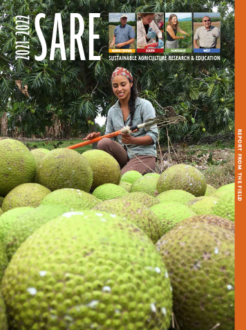“Institutionalized food is the forgotten part of the food revolution,” says Ann Swanson, talking about the lack of fresh produce available from local institutions in her community of Champaign–Urbana, IL. Inspired, Swanson used a SARE Farmer/Rancher grant to create new opportunities for local farmers, launch a series of educational classes and expand institutional capacity to serve healthier food.
SARE’s 2021–2022 Report from the Field shows how Ann Swanson and other SARE grantees are shaping the future of American agriculture.
Swanson is farm director at Hendrick House, a business that provides catering services for the University of Illinois Urbana-Champaign. Through her work, she identified a lack of knowledge about healthy food systems as a barrier to institutional use of locally sourced produce.
Teaming up with local nonprofits and schools, Swanson used her SARE grant to launch a series of classes to teach local youth where their food comes from and how to make healthy food choices. Swanson also held workshops for food service staff highlighting how to use, store, and prepare local and seasonal foods.
The grant allowed Swanson to make significant strides to improve the access of healthy and local food in her community. Hendrick House has doubled its food purchases from local farms and expanded service to a community college and medical center. “We hope to make a change in institutionalized food that will be ongoing beyond the scope of this grant,” says Swanson.
Other stories in Report from the Field that demonstrate how SARE grantees are improving the sustainability of U.S. agriculture include:
- Increasing Food Security in a Mohican Tribal Community
- North Dakota Farmers Lead the Way With Bale Grazing
- Giving South Carolina Farmers Better Access to Wholesale Markets
- Texas Farmers and Scientists Explore Carbon Markets for Soil Health Practices
- Low-Cost Energy Solutions for Appalachian Greenhouse Growers
- Centuries-Old Nursery Methods Prove Successful in Rice Paddies
- Farmer-Focused Research Identifies Practical Climate Change Adaptation Strategies
- Attracticidal Spheres and IPM Help Wage War on Invasive Pest
- Trainings Support Tribal Management of Blackfeet Nation’s Agricultural Strategic Plan
- Seed Production in Southern Oregon has a Promising Future
- On-Farm Assessments Provide Data on Improving Breadfruit Production
Download or order your free print copy of 2021–2022 Report from the Field at https://sare.org/report or by calling (301) 779-1007. 2021–2022 Report from the Field is available in quantity for free to educators for use in educational workshops, classes or tours.
